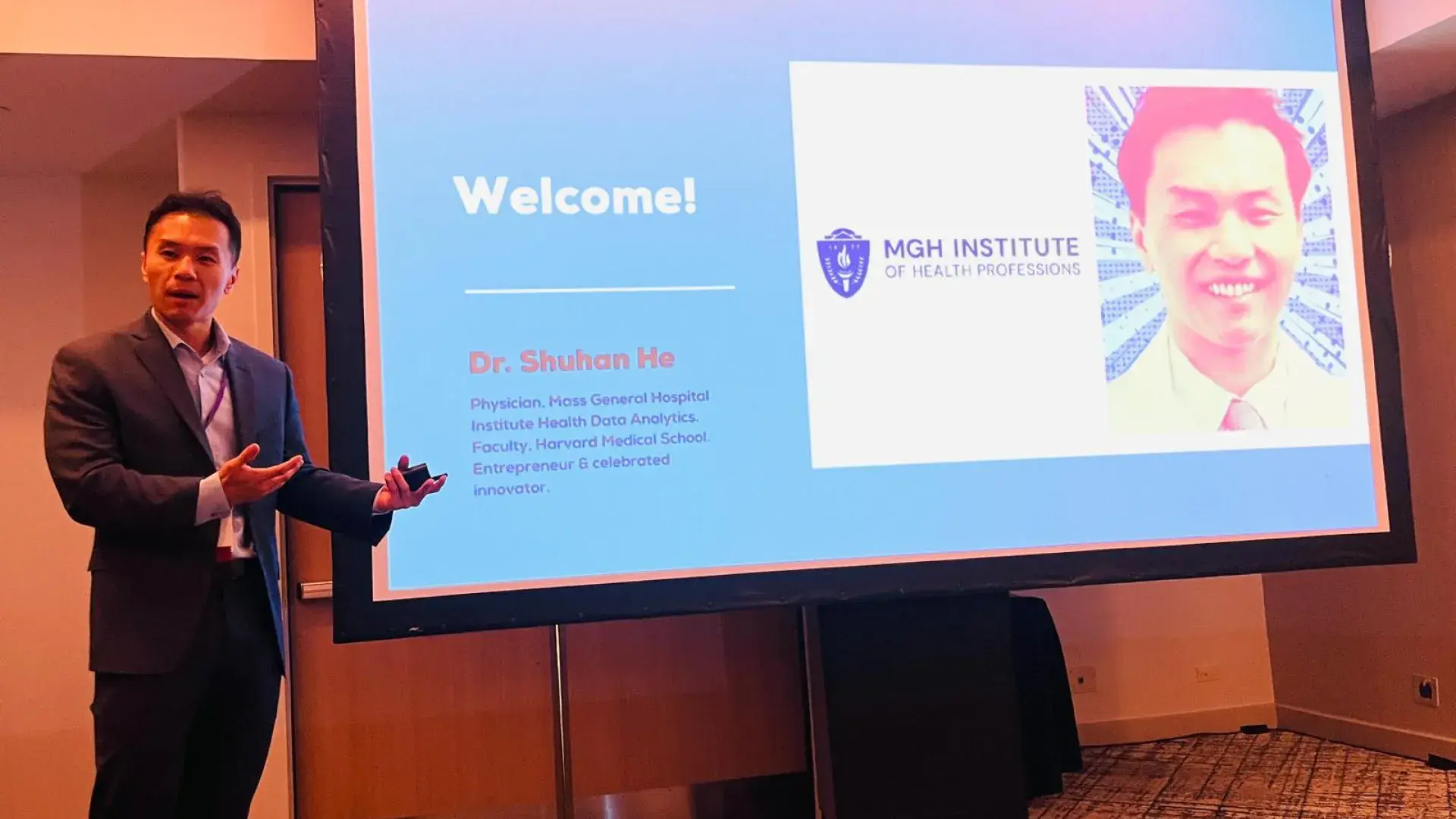
Largest association of physicians-in-training represents opportunity to expand Healthcare Data Analytics program
The MGH Institute of Health Professions’ Healthcare Data Analytics program has entered a partnership that could potentially reshape the program and drastically increase student enrollment.
At its national conference in Washington, D.C. last Saturday, the American Medical Student Association (AMSA) announced that its Scholars Program will use the MGH Institute’s Machine Learning course, now offered on the edX platform, as the core fundamental curriculum for its new research development program. The hope is the medical students who finish coursework on edX will want to continue and transfer credits into the MGH Institute’s Master’s in Healthcare Data Analytics program.
“That's something we hope can be a pathway for any medical student who wants to strengthen their career, especially if they're looking for research and more advanced degrees in their career trajectory, or increase their competitiveness for any residency application,” said Shuhan He, MD, Director for the Healthcare Data Analytics program. “They will have that really strong additional part of their application. That's an incredibly unique part of any physician today, which is healthcare data analytics.”
The AMSA Scholars Programs and its educational arm, the AMSA Academy, offer various different courses and opportunities to students that they might not have access to at their own institutions.
“The idea is to take this exciting momentum that we're seeing in the digital healthcare innovation space and recognize that future physicians need more education both from a research perspective but also from a data analytics perspective as it applies to healthcare,” said Annelise Silva-Chong MD EdM , National President for AMSA. “The idea is to partner with expert institutions and experts in the field to guide our students in these kinds of innovative areas. We're looking forward to this new venture together to develop an informatics and health analytics scholars program together as the first iteration of what this new partnership in this new area of medical education can be.”
AMSA is the largest and oldest independent association of physicians-in-training in the country, overseeing about 30,000 medical students across 150+ chapters around the world. Combine those numbers with the course’s asynchronous nature, and you can understand why the sky is the limit when it comes to interest and possibilities.
This summer, the Institute and AMSA will engage in a pilot program where AMSA Scholars will access the Machine Learning content on edX, and from there, identify students who might be interested in furthering their education and become a part of AMSA’s new research development branch.
“Our hope is to grow the AMSA cohort into the fall, and next fall, and next spring,” said He, who is also an emergency department physician at Massachusetts General Hospital. “You can then imagine a full-time or part-time Fellow and scholars that come in and take our master's program while they are doing medical school, transitioning it into residency, and even finishing it as they become full-fledged attending physicians.”
He has worked with AMSA in the past through giving keynote speeches, appearing at events, and working with the organization’s new innovation festival that's helping give exposure to student entrepreneurs. The pilot program is the next iteration between AMSA and the Institute.
“This is the first time we're really taking things to a different level with our scholars programs,” said Silva. “We're helping build that kind of longitudinal engagement for students and building out these new opportunities for them to network and to partner, and to immerse themselves in the field.”
He says if this partnership goes well, he can imagine scaling this quickly.
“Partnering with a national organization like AMSA gives us a unique opportunity to reach thousands of medical students across the country in a coordinated and scalable way,” said He. “This model complements the work we’re also doing with individual medical schools—allowing us to engage students both through their institutions and through the organizations that support them during medical school, residency, and beyond. We believe this framework can extend to other health professions as well, including nursing, physical therapy, speech-language pathology, and physician assistant programs.“
Today, data is embedded in every aspect of clinical care—not just for physicians, but for all frontline health professionals. Rather than relying on separate data analysts, we see a future where clinical providers themselves are equipped with the tools to understand, generate, and act on data. That’s the model: integrating data fluency directly into clinical training across disciplines, empowering a new generation of providers to lead innovation from within their own fields.”
As the pilot program gets off the ground, AMSA also sees endless opportunities.
“I think we're incredibly grateful for the ability to partner with an institution that has consistently been at the top of the game in this kind of world,” said Silva. “To be partnering with leadership in this manner, to help rethink this pocket of medical education is so exciting, and I think this is going to be an incredible venture to help bring so many more opportunities for future physicians that are so needed, not only for the enrichment of students, but also ultimately for patients too.”
Do you have a story the Office of Strategic Communications should know about? If so, let us know.
